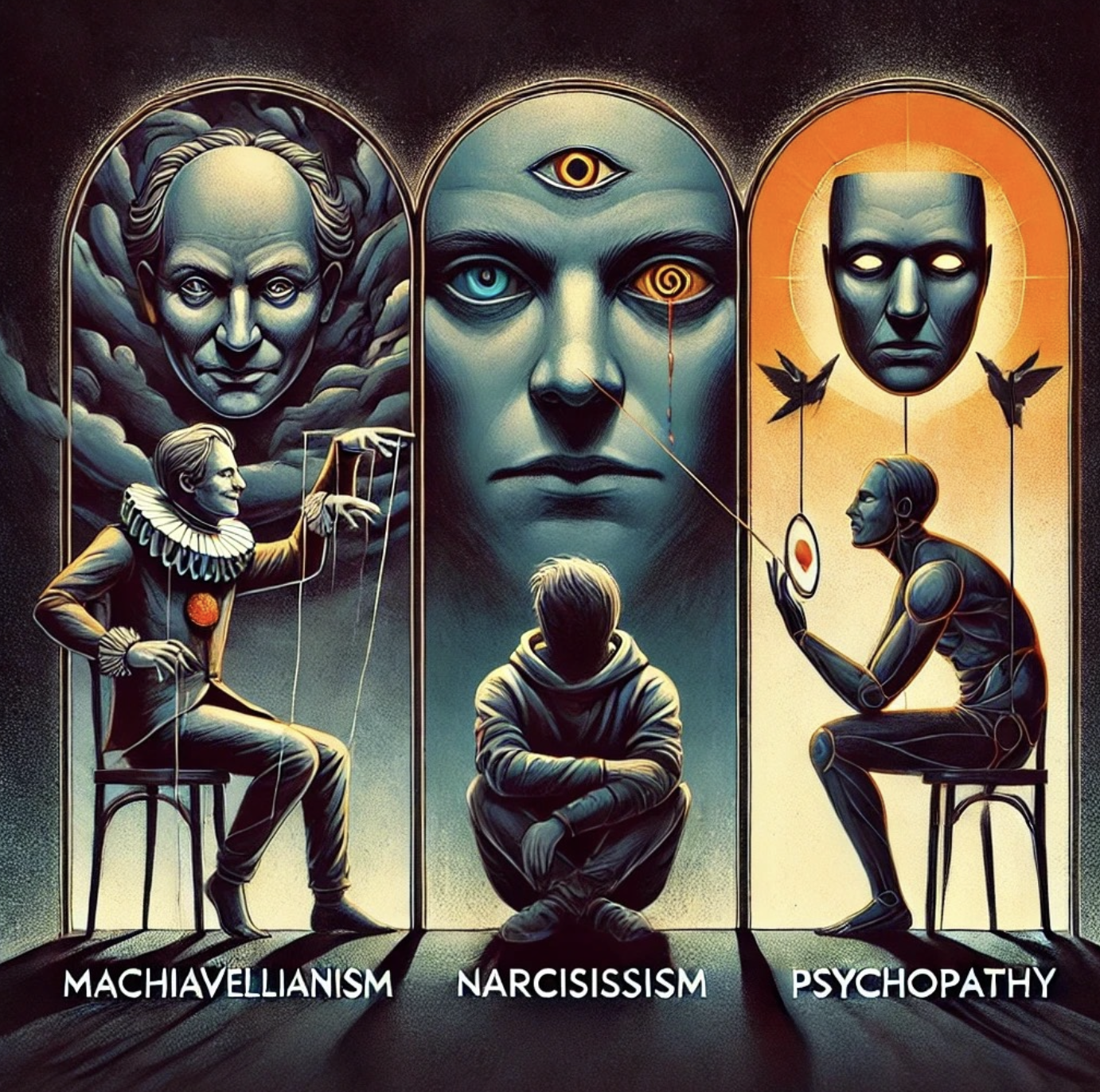
Personality exists on a broad spectrum, from traits that foster kindness and empathy to those associated with manipulation and exploitation. At the far end of this spectrum lies the Dark Triad, a trio of personality traits—Machiavellianism, narcissism, and psychopathy—that are often linked to deception, power-seeking, and a lack of empathy.
These traits exist in varying degrees across the population. While some people may show mild tendencies, others exhibit these traits more strongly, sometimes in ways that harm relationships, workplaces, and even society as a whole.
Breaking Down the Dark Triad
Each of the three Dark Triad traits shares a common thread: a lack of empathy and concern for others. However, they manifest in different ways:
1. Machiavellianism: The Master Manipulator
Named after the Renaissance philosopher Niccolò Machiavelli, this trait is defined by cunning, deceit, and emotional detachment. People high in Machiavellianism (“High Machs”) tend to:
- Be strategic and calculating, manipulating others for personal gain.
- Distrust others, assuming most people are selfish.
- Avoid emotional connections, preferring control over intimacy.
2. Narcissism: The Self-Obsessed Egoist
Narcissism is an inflated sense of self-importance. But it’s not just arrogance—there are different types:
- Grandiose narcissists openly seek attention, admiration, and power.
- Covert narcissists appear shy or self-deprecating but secretly crave validation and superiority.
Regardless of the type, narcissists tend to see others as sources of admiration rather than as equals. (Miller et al., 2017)
3. Psychopathy: The Ruthless Rule-Breaker
Psychopathy is often the most dangerous of the three traits. It’s characterized by:
- A lack of guilt or remorse
- Emotional coldness
- Impulsive or thrill-seeking behavior
Psychopathy exists on a spectrum. Primary psychopaths are cold and calculated, while secondary psychopaths are more impulsive and emotionally reactive. (Hare, 2003)
The Light Triad: The Opposite of the Dark Triad
While the Dark Triad describes self-serving and exploitative tendencies, its counterpart—the Light Triad—reflects a more compassionate and ethical approach to life. Researchers propose three key traits that make up the Light Triad: (Kaufman et al., 2019)
- Kantianism – Treating others as ends in themselves rather than as means to an end.
- Humanism – Valuing the dignity and worth of every individual.
- Faith in Humanity – Believing that most people are fundamentally good.
People who score high on Light Triad traits tend to report greater life satisfaction, stronger relationships, and more personal growth. (Zettler et al., 2020)
The Dark Tetrad: When the Dark Triad Gets Even Darker
Psychologists later expanded the Dark Triad to the Dark Tetrad by adding a fourth trait: Sadism—a tendency to derive pleasure from others’ suffering. Sadists may enjoy:
- Inflicting harm—physically, emotionally, or psychologically.
- Humiliating others to assert dominance.
- Watching or causing suffering, even when there’s no personal gain. (Buckels et al., 2013)
Unlike the other Dark Triad traits, sadism is unique in that harm itself is the goal, not just a side effect of achieving power or status.
What Causes Dark Personality Traits?
Dark traits are influenced by both genetic and environmental factors. Researchers have found they are strongly correlated with low scores on honesty-humility, agreeableness, and conscientiousness—traits associated with fairness, empathy, and self-discipline. (Ashton & Lee, 2007)
Other factors include:
- Gender – Men score higher on Dark Triad traits than women. (Jonason et al., 2010)
- Culture – The prevalence of dark traits varies across societies and historical periods. (Furnham et al., 2013)
- Social environments – Some argue these traits evolved as adaptive strategies in competitive environments. (Wilson et al., 2019)
The Real-World Impact of the Dark Triad
Studies have linked the Dark Triad to several negative life outcomes, including:
- Lower life satisfaction (Kaufman et al., 2019)
- Higher aggression and unethical behavior (Jones & Paulhus, 2014)
- Shorter-lasting relationships due to emotional detachment and manipulation (Campbell & Foster, 2007)
Meanwhile, Light Triad traits are associated with:
- Greater well-being and fulfillment
- Stronger social connections
- Higher levels of personal growth
Assessing Dark Personality Traits
While not classified as mental illnesses, Dark Triad traits overlap with some personality disorders, such as Narcissistic Personality Disorder (NPD), Antisocial Personality Disorder (ASPD), and Borderline Personality Disorder (BPD).
Psychologists use various self-assessments to measure these traits, including:
- The Short Dark Triad (SD3) (Jones & Paulhus, 2014)
- The Dark Triad Dirty Dozen (DTDD) (Jonason & Webster, 2010)
- The Comprehensive Assessment of Sadistic Tendencies (CAST) (Plouffe et al., 2017)
While these tests can indicate the presence of dark traits, only a licensed mental health professional can diagnose personality disorders.
Can Dark Personality Traits Be Treated?
Since individuals with Dark Triad traits may lack motivation to change, treatment can be challenging. However, research suggests that with effort, change is possible.
A 16-week study found that interventions aimed at increasing agreeableness and emotional awareness led to reductions in all three Dark Triad traits. (Stieger et al., 2021)
Effective therapy options include:
- Cognitive Behavioral Therapy (CBT) – Helps individuals restructure harmful thought patterns.
- Dialectical Behavior Therapy (DBT) – Focuses on emotional regulation and impulse control.
- Schema Therapy – Addresses deep-rooted emotional wounds that may contribute to manipulative or destructive behaviors.
- Mentalization-Based Therapy (MBT) – Enhances one’s ability to understand and empathize with others.
Final Thoughts
While Dark Triad traits can be manipulative, self-serving, and harmful, they exist on a spectrum, and not everyone who exhibits these tendencies is dangerous. Understanding the Dark Triad helps us navigate relationships, workplaces, and social interactions with greater awareness.
If you recognize these traits in yourself or someone close to you, seeking professional guidance can provide tools for personal growth and healthier relationships. Awareness and self-reflection can be the first step toward choosing a path of empathy over exploitation.


